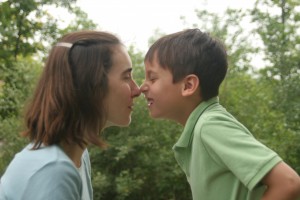
Resources  , Dr. Daniel Siegel defines episodic memory as “the memory of self across time.” It is the feeling of remembering an occasion, not just knowing about the occasion. It is the ability to make predictions about future outcomes based on past personal experience. It is the integration of cognitive, emotional and social aspects of past events. This “mental time travel” is something that most people do instinctively beginning around age 3, but it is notably underdeveloped in many individuals with autism or other neurological conditions. People who are delayed in the growth of episodic memory -- like my son -- may suffer severe anxiety because they are unable to use their past history to form ideas about future events. Living only in the present with no past and no future may be a spiritual ideal in some cultures, but the reality is quite harsh. It’s as if everything is happening for the first time, and there’s no way to know what could happen next.
How can someone teach another person the feeling of remembering past experiences? Is it even possible? Yes, in fact, it’s the most ambitious part of my summer plan.
All through our fun and work, I have my little camera. My kids dislike being photographed, so I don’t ask them to pose -- I quietly take candid pictures of the backs of their heads. Sometimes I get 30 or 60 seconds of video, too. I attempt to capture the most powerful emotional moments for better or for worse, including temper tantrums, panic attacks and general misbehavior. I choose one or a few photos from each day of vacation to highlight the most memorable events and, more importantly, the human relationships being built. We review the photos and short movies at home at the end of a long summer day, and then add the daily photos with captions to a book. As the summer progresses, I can see my son’s empathy growing. My two boys become closer as they learn simple co-existence. At some point, a joyful spark lights up inside. That’s what summer is all about.
[gallery link="file" order="DESC"]
, Dr. Daniel Siegel defines episodic memory as “the memory of self across time.” It is the feeling of remembering an occasion, not just knowing about the occasion. It is the ability to make predictions about future outcomes based on past personal experience. It is the integration of cognitive, emotional and social aspects of past events. This “mental time travel” is something that most people do instinctively beginning around age 3, but it is notably underdeveloped in many individuals with autism or other neurological conditions. People who are delayed in the growth of episodic memory -- like my son -- may suffer severe anxiety because they are unable to use their past history to form ideas about future events. Living only in the present with no past and no future may be a spiritual ideal in some cultures, but the reality is quite harsh. It’s as if everything is happening for the first time, and there’s no way to know what could happen next.
How can someone teach another person the feeling of remembering past experiences? Is it even possible? Yes, in fact, it’s the most ambitious part of my summer plan.
All through our fun and work, I have my little camera. My kids dislike being photographed, so I don’t ask them to pose -- I quietly take candid pictures of the backs of their heads. Sometimes I get 30 or 60 seconds of video, too. I attempt to capture the most powerful emotional moments for better or for worse, including temper tantrums, panic attacks and general misbehavior. I choose one or a few photos from each day of vacation to highlight the most memorable events and, more importantly, the human relationships being built. We review the photos and short movies at home at the end of a long summer day, and then add the daily photos with captions to a book. As the summer progresses, I can see my son’s empathy growing. My two boys become closer as they learn simple co-existence. At some point, a joyful spark lights up inside. That’s what summer is all about.
[gallery link="file" order="DESC"]
How to get through 82 Days of Summer Vacation
82 days of summer vacation......
yeah, I counted. For my autistic son, that means
82 days of stimming.
82 days of wearing only long-sleeve shirts no matter how hot the weather is.
82 days of hysterical laughter turning into hysterical crying.
82 days of picking on his little brother.
We have
No summer services from the school district.
No family members to help within 250 miles.
No fancy trips to break up the summer.
No respite care.
It’s not going to be easy for anyone in my family.
So the summer plan is all on me. If there’s one thing I know how to do well, it’s to find something positive in a difficult situation.



